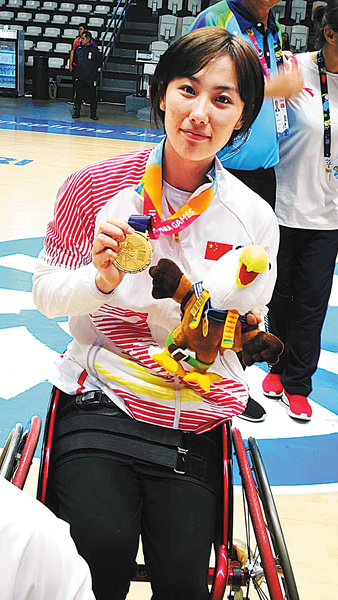

Sustainability problem
Yet wheelchair basketball is not exactly prospering in China. There were only nine provincial-level teams at the start of the year, and has dropped further, to eight, when one disbanded in November.
"Lack of spectators is a main problem," says Chen Qi, coach of the national team. "Without enough people watching it, the sport does not have much commercial value and has to rely heavily upon government funding and donations."
While normal basketball events can sell their broadcast rights at billions of yuan, the wheelchair version can barely find a TV station to broadcast their matches. Furthermore, there are often so few spectators in the stands that Dai and her teammates are accustomed to playing without applause.
As a result, the provincial-level teams can't offer an attractive salary for their players. In Guangdong province, for example, the subsidy for players is about 3,000 yuan ($471) a month, which is the national highest.
Then, when wheelchair basketball players retire, the opportunities on offer are far fewer than their counterparts in normal basketball. "The majority of them just leave, so most of our players have to acquire other skills outside the sport in order to find a job upon retirement," Chen Qi says.
As a result, while the normal national basketball team selects only professional players, the national wheelchair basketball team is open to amateurs, too.
Another reason why they recruit players from the amateur ranks is that they want to encourage more people with physical challenges to participate.
"Wheelchair basketball is more than a competition," Chen Qi says. "For people with physical impairments, it is a chance to get outside and know that they can make it."
Chen Qi, the coach, is himself one of them. Over the decades, he has helped to recruit many players for the sport. Lin Suiling from Guangdong provincial team is one. When Lin started playing, she found it very hard to marry the three key elements-playing, controlling the wheelchair, and maintaining balance-and she often fell.
Dai agrees with Chen Qi. "It is after having won the silver medal in Tokyo this year that we got nationwide attention, but the meaning of wheelchair sport is much more than winning medals," Dai says.
"For me, it is a way of regaining confidence and I hope more people like me can find a way to make themselves known to the world."